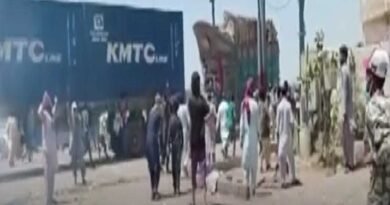150 People Killed In Student Unrest, Says Bangladesh Govt; Announces Nationwide Mourning
DHAKA: For the first time, the Bangladesh government on Monday officially acknowledged that 150 people were killed across the country during the students’ unrest over the quota system.
Violence gripped Bangladesh recently and the government called in the army to quell protests against job quotas. The protests, which started in universities and colleges earlier this month, quickly turned into a more widespread agitation against Prime Minister Sheikh Hasina and her government. The unrest has left several thousand people, including policemen, wounded and major government installations damaged.
“The government has decided that a nationwide mourning will be observed tomorrow… People have been urged to wear black badges to mourn the deaths (during the violence),” Cabinet Secretary Mahbub Hossain told a media briefing after a meeting chaired by Hasina at the Prime Minister’s Office (PMO).
He said mosques, temples, pagodas and churches across the country were also urged to offer prayers for the departed souls and the wounded people.
The top bureaucrat said Home Minister Asaduzzaman Khan Kamal presented a report at the meeting about the overall situation and confirmed 150 deaths in clashes across the country.
The announcement came on a day when the military and paramilitary troops patrolled the streets of the capital Dhaka while police in riot gear enforced a strict vigil as a faction of the protesting students overnight called a new round of protests.
The group called the new protest after six of their coordinators announced the withdrawal of the demonstrations, which the protestors said was obtained under duress in police custody.
The six student leaders in an appearance before the media overnight announced the withdrawal of the street demonstrations as their demand for reforms in the quota system was met by the government following a Supreme Court order.
“We have mobilised forces to prevent fresh violence,” a police official said.
Witnesses and live TV footage showed the security forces guarding major points in the capital with military and police armoured personnel carriers patrolling the streets alongside the paramilitary Border Guard Bangladesh.
The protests subsided after the apex Appellate Division of unitary Bangladesh’s Supreme Court on July 21 ordered a massive quota reform, keeping only seven per cent of reserve posts instead of the existing 56 per cent.
The government subsequently issued a Gazette notification in line with the order saying 93 per cent of jobs would be open to candidates on merit.
“Our main demand for logical reforms to the government job quota system has been met,” student coordinator Nahid Islam on Sunday said in a video message, calling for educational institutions to re-open.
However, other students, calling for a new protest, claimed their leaders were forced to announce while in police custody. Meanwhile, the government ignored an ultimatum to release their leaders and apologise for those killed in deadly unrest.
Groups of youths held scattered street protests but were quickly chased away by police in parts of the capital and elsewhere.
Their demand included a public apology from the prime minister for the casualties, the dismissal of several of her ministers, and the reopening of schools and universities around the country which were closed for an indefinite period as the unrest reached its peak.
A nationwide curfew gripped Bangladesh mid-July, and the government called in the army in aid to the police and paramilitary Border Guard Bangladesh (BGB) to quell protests against job quotas that, according to media reports, killed more than 200 persons across the country.
The mass circulation ‘Prothom Alo’ newspaper cited 210 deaths, 113 of them being children. Most others were juveniles and youths. The newspaper said at least 9,000 people were arrested nationwide since the beginning of the unrest.
According to observers and political commentators, the students protests were largely peaceful until the ruling Awami League student activists were asked to quell the protestors and police attacks on demonstrators, who were later presumed to be backed by the opposition political quarters.
The government leaders said the peaceful and issue-specific students’ movement was not involved in violence and attributed the anarchy to the Jamaat-e-Islami (JI) party and their student activists backed by the main Opposition outside parliament Bangladesh Nationalist Party (BNP) of ex-premier Khaleda Zia. The BNP had boycotted the January 7 elections.
The government has accused JI of hijacking the protests to cause a nationwide anarchy.
The unrest significantly impacted Bangladesh’s economy with the Foreign Investors Chamber of Commerce and Industries (FICCI) estimating the economic impact to be around USD 10 billion and rising.
President of the country’s apex business chambers, Bangladesh Chambers of Commerce and Industries (FBCCI), Mahbubul Alam, said the major export-earning garment industries alone incurred losses of Bangladeshi Taka 6,4000,000 (USD 5,45,167).
Bangladeshi authorities said they restored internet services in the country after a 10-day disconnection of both mobile internet and the key social media platform as the situation returned to normal following the disbandment of the protests.
However, the resumption of mobile internet on Sunday failed to relieve tens of thousands of F-commerce sellers, who rely on Facebook to sell their goods and services, were yet to resume. (PTI)




